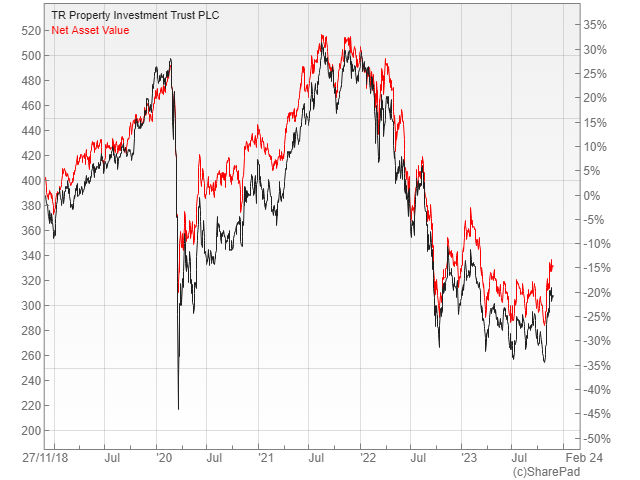Resilient Performance From TR Property

It has been a difficult environment for commercial property with the increase in interest rates and challenging economic outlook adding to investor uncertainty. Against this backdrop, the recent performance from the TR Property Trust (LON: TRY) looks pretty good and further enhances its impressive record of beating the benchmark.
TRY is a unique closed-ended fund with a £1.2bn portfolio that is mainly invested in listed property companies in the UK and Continental Europe. Its interim accounts for the six months to the end of September reveal a 3.3% NAV total return, which was well ahead of the 0.8% decline in the index.
Longstanding manager Marcus Phayre-Mudge says that pan European real-estate equities traded in a tight 12% range over the period. He believes that the performance was largely driven by macro considerations and the outlook for rates, rather than the underlying fundamentals.
The Portfolio
At the end of October the biggest weighting was the 59% allocation to continental property companies, with a further 34% held in UK real-estate stocks and seven percent in UK direct property. Turnover during the six month period was a higher than usual 18.6% due to three of the holdings being subject to M&A activity, which helped to boost the returns relative to the benchmark.
TR Property’s UK retail exposure remains focused on the warehousing side of things through Ediston (LON: EPIC) and Land Securities (LON: LAND), whose premium outlets business continues to perform well. The fund also managed to steer clear of the latter’s nearest rival British Land (LON: BLND) that has massively underperformed due to its unfavourable debt position.
Phayre-Mudge prefers companies with property portfolios that offer higher earnings and lower levels of development exposure, as well as those located away from areas that are dominated by the financial services industry such as the City and Docklands.
Testing times
One of the most dramatic elements of the accounts was the 39% fall in earnings compared to the same period last year, with the final figure coming in at 7.31 pence per share. This had been flagged well in advance and was due to the non-recurrence of several beneficial items, as well as the impact of dividend cuts and suspensions by several Swedish and German residential holdings.
The Board has strategically built up a healthy revenue reserve and is willing to use the funds to supplement its distributions, as long as it is comfortable that it will achieve a covered dividend in the longer term. Because of this the trust was able to maintain its interim dividend of 5.65p, giving an historic yield of five percent.
If you are thinking of investing, it is important to appreciate that although the fund aims for a progressive income profile, its primary objective is to exceed the performance of the benchmark on a total return basis.
Outlook
The current interest rate rising cycle has been underway since mid-2022 and Phayre-Mudge believes that rates will remain at these levels for the foreseeable future. Against this backdrop, he will continue to focus on those market segments that are still experiencing rental growth driven by an imbalance in supply and demand.
During the reporting period the discount hovered around eight percent, which is slightly wider than the five-year average of 5.4%, with the figure currently standing at seven percent. Despite this there were no share repurchases throughout the six months.
It has been a tough couple of years for commercial property and this has affected the longer term numbers with the fund experiencing an NAV decline of 11.5% over the five years to the end of October, which was well ahead of the 26.27% loss by its benchmark. The broker Numis says that the seven percent discount is undemanding given the manager’s strong track record.

Comments (0)